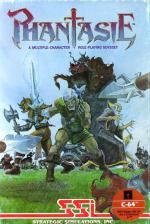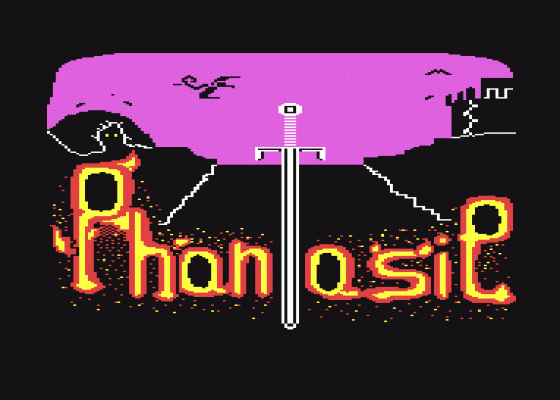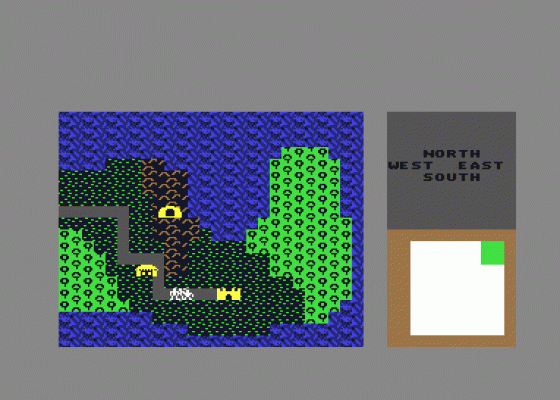
Zzap
 1st March 1986
1st March 1986
Categories: Review: Software
Publisher: Strategic Simulations Inc
Machine: Commodore 64
Published in Zzap #11
Phantasie
Several companies have tried to produce advanced role playing sagas for home micros. The Ultima series constitutes one of the success stories. In a more limited way, a game which successfully employs a lot of role playing features is The Temple Of Apshai Trilogy. SSI's Phantasie uses a fantasy world called the Isle of Gelnor. From an old storyteller, you hear of the evil Black Knights and their terrible leader, the sorcerer Nikademus. Deciding that defeating this evil force would be a good way to earn fame and fortune, you set out to put together a party of like-minded adventurers.
The game has mixed graphic and text displays for everything. All the options are accessible via the joystick or keyboard. The first thing to do after the game has loaded is to create a band of adventurers to aid you on your quest. This entails going to the local inn - the traditional recruiting ground in role playing games. The game allows the generation of practically any kind of party you require. The first stage in this process is to decide the race of the character to be developed. These include Human, Elf, Dwarf, Halfling and Gnome. Then the class or profession of the character can be decided. This can be Thief, Fighter, Ranker, Monk, Priest or Wizard.
Each character also has a series of mental and physical characteristics, expressed as numerical values, which affect the probability of success by that character in various activities. Therefore a Thief would do well to have a high dexterity level if he or she is to be successful when picking locks or even someone else's pocket.
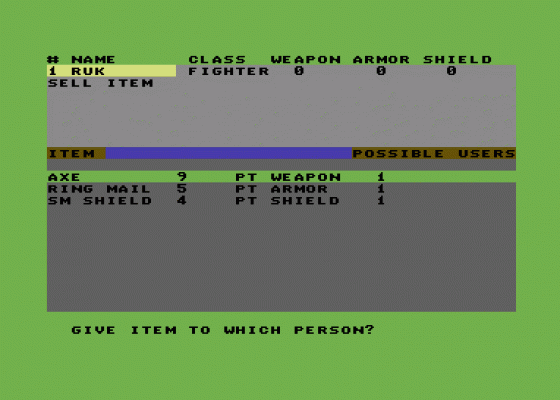
Naturally, each character can carry a certain number of weapons to defend itself. These are obtained by moving the group to armoury and highlighting the character you wish to do the 'shopping'. Once you feel a character is well enough equipped, you can use the 'another shopper' command to fit out another character. There are plenty of weapons at the armoury, including swords, flails, spears, maces and pitchforks. Once your merry band is fully geared you can take them back to the inn.
The inn plays an important part in the game and, apart from being a place where characters can rest, is the only location where those characters may distribute and sell items. The town also has a bank where you can withdraw or deposit gold pieces - useful, gold's heavy stuff and not really the sort of thing that should be carried around a rather violent land. If you want to get your score highlighted, select the 'mystic' option and it will be shown. Selecting mystic also gives the overall strength of the party.
When the party is equipped and ready to go on their travels, an option to leave the city is selected. The screen display changes to a pictorial view of a wilderness area. This area is several times larger than the screen itself and a small display in the bottom right corner of the screen reveals whereabouts in the overall world the party is situated. There are occasional random encounters in the wilderness, another feature lifted straight from conventional RPGs. Some of these encounters involve none too pleasant creatures, other times Non-player characters may be encountered for better or worse.
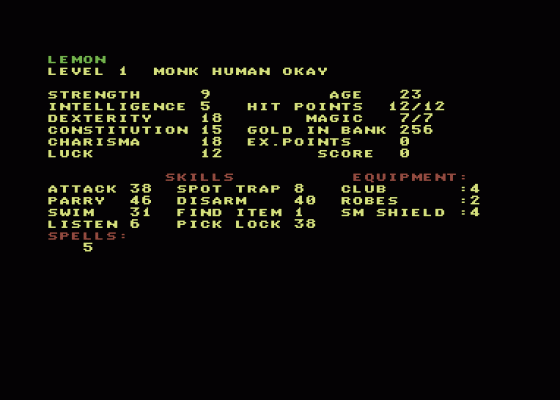
Whilst moving through the countryside, a kind of sparse narration takes place in a small window at the top of the screen. Eventually, the party is likely to come across a dungeon and, more often than not, will want to explore it. Entering and leaving dungeons are the only times when the disk needs to be changed over. Once the dungeon has been entered, the screen becomes a solid grey area containing a hidden map. The more the party experiment and explore, the more of the map is revealed to the group. Again the narration appears at the top of the map. Should the player want to examine something they encounter, that option is open to them - but more often than not it's just scenery.
This is where characters' abilities really come into their own. Thieves can help spot and diffuse traps, although one of their best abilities in conventional role playing is their usefulness as advanced scouts for the party. This is not possible due to the inherent complexities involved, but this is no great shame. If any rather nasty creatures are encountered (and they have a tendency to exist in the plural), the party can flee, fight, or attempt to communicate. Normally fighting will be the only fruitful course of action. Interestingly, each member of the party can choose his own fighting strategy. Combat is handled in turns during which hits inflicted on creatures or adventurers are monitored. At the end of each turn, either the whole party or individual members thereof may adopt a new strategy.
The only problem with this system is that it is quite possible to continue fighting, and even be wounded, by a dead creature. On winning a fight against a nasty, I accidentally selected the fight option and was immediately plunged into a battle with the corpse of a giant snake. This did not stop the computer from killing off my party's only magician! He was fairly useless, as I could not get him to use spells in combat, but it's still a pretty mean thing to do. I suppose SSI are just poor losers...

On the subject of dead magicians, although Zzap, my party's illusionist extraordinaire, had been so cruelly kilted off, when I eventually returned to the inn to distribute the wealth accumulated during the first adventure I was asked how much I would like to give to him. These are unfortunately clumsy and unwanted features of an otherwise imaginative and highly playable game. If care is taken, they should cause no problems, but that's no excuse for them.
After a fight, assuming the party's still in one piece, the computer shows how many experience points have been earned by each character as a result of his actions. This way, when the party return to the city they may opt to be trained. If they have earned enough experience points and pay a fee, experts in their field will teach them skills which will make the characters more powerful and useful in their next adventures. Probably a good deal of points will have to be earned before the party are ready for their greatest challenge - but that should provide some good adventures in the meantime.
It's so unfortunate that a couple of nasty bugs had to be present in the combat system. Games of this type do have limited appeal, but this emulates solitary role playing so well, it really deserved to be neatened up more than it has been. It's impossible to tell just how much work will be required before the party can take on Nikademus. No doubt, if you're a role playing addict, it will be worth the wait.
Verdict
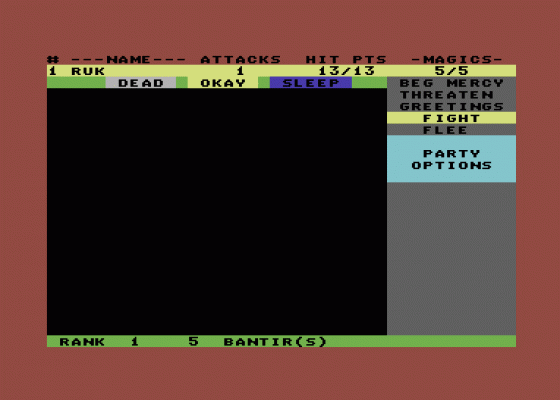
Presentation 89%
Excellently packaged and displayed.
Graphics 82%
Very good for a game of this type.
Instructions 88%
Everything you needed to know about Gelnor but never dared to ask.
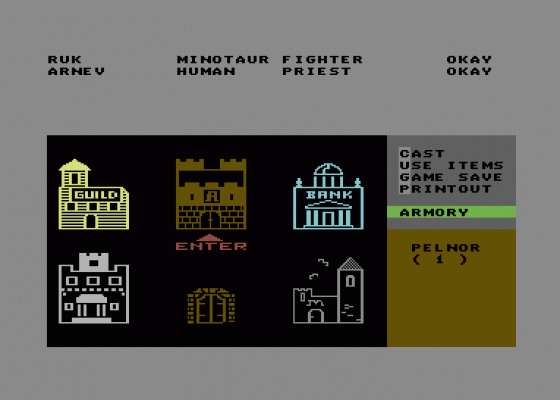
Authenticity 87%
Very thorough RPG simulation.
Playability 83%
Much easier to get into if you're already used to the concept of role playing.
Overall 87%
Otherwise excellent game marred somewhat by careless combat implementation.
Other Reviews Of Phantasie For The Commodore 64
Phantasie (US Gold/SSL)
A review
Phantasie (SSI)
A review by Andy Moss (Commodore User)

